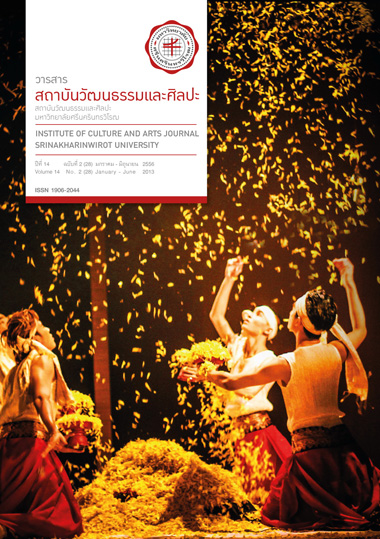ตลาดย้อนยุคสามชุก: การเมืองเรื่องพื้นที่และธุรกิจแห่งการถวิลหาอดีต SAMCHUK, THE RETROMARKET: THE POLITICS OF SPACE AND THE BUSINESS OF NOSTALGIA *
บทคัดย่อ
บทคัดย่อ
งานวิจัยฉบับนี้มีวัตถุประสงค์เพื่อศึกษาตลาดย้อนยุคสามชุกในบริบทของการเมืองเรื่องพื้นที่และในบริบทของธุรกิจแห่งการถวิลหาอดีตโดยใช้วิธีการวิจัยเชิงคุณภาพ ผลการศึกษาพบว่า กลวิธีสำคัญที่ชาวตลาดสามชุกนำมาใช้เพื่อต่อสู้ ต่อรอง และปกปักรักษาพื้นที่ตลาดสามชุกที่เป็นทั้งที่อยู่อาศัยและที่ทำมาหากินมาตั้งแต่บรรพบุรุษไม่ให้ถูกไล่รื้อถอนจากกรมธนารักษ์ คือ 1) การผลิตสร้างความหมายใหม่ให้ตลาดสามชุกกลายเป็น “สามชุกตลาดร้อยปี” หรือ ‘ตลาดย้อนยุคสามชุก’ แหล่งท่องเที่ยวเชิงถวิลหาอดีต 2) การรื้อฟื้นอัตลักษณ์ในอดีต ไม่ว่าจะเป็นโคลงนิราศสุพรรณและสุนทรภู่ ขุนจำนงจีนารักษ์ วัตถุข้าวของ เรื่องราวความทรงจำ และอาหารในชีวิตประจำวันของผู้คนในตลาดสามชุกให้มาเป็นสินค้าที่สามารถซื้อขายได้ในปัจจุบันเพื่อการบริโภคของนักท่องเที่ยว รวมทั้ง 3) การสถาปนาให้มรดกทางวัฒนธรรมของท้องถิ่นกลายเป็นมรดกทางวัฒนธรรมของชาติและนานาชาติ ผลการวิจัยเรื่องนี้สามารถใช้เป็นแนวทางในการทำความเข้าใจชุมชนที่กำลังเปลี่ยนผ่านไปเป็นชุมชนแห่งธุรกิจการท่องเที่ยวเชิงถวิลหาอดีต รวมทั้งชุมชนที่มีมิติด้านการเมืองเรื่องพื้นที่ทั้งในและต่างประเทศได้เป็นอย่างดี
คำสำคัญ: ตลาดสามชุก ตลาดย้อนยุค การเมืองเรื่องพื้นที่ ธุรกิจแห่งการถวิลหาอดีต
Abstract
The objectives of this research were to study Samchuk, the retromarket in the context of the politics of space and the business of nostalgia. The methodology of this research was a qualitative study. The findings indicated that the tactics of power of people in Samchuk that were used to contest, negotiate and protect their places from demolition by The Treasury Department were 1) the production of a new meaning for Samchuk market as “Samchuk, the one hundred year old market” or ‘Samchuk, the Retromarket’ 2) the revitalization of Samchuk’s identities from the past such as Sunthorn Phu and Nirat Supan, Khunjumnongjeenarak, appliances, stories from local peoples’ memories and daily foods to be commodities in the present, in order to increase tourist consumption and 3) the enhancement of local cultural heritage to be regarded as a part of national and international cultural heritages. The results of this research can be used as a model to comprehend the communities that are passing into the business of nostalgia tourism and the communities which engage with the politics of space that occur in Thailand and other countries around the world.
Keywords: Samchuk market, retromarket, politics of space, business of nostalgia
*งานวิจัยนี้ได้รับทุนอุดหนุนการวิจัยจากบัณฑิตวิทยาลัย มหาวิทยาลัยศรีนครินทรวิโรฒ
Downloads
ดาวน์โหลด
รูปแบบการอ้างอิง
ฉบับ
ประเภทบทความ
สัญญาอนุญาต
บทความทุกบทความที่ได้รับการตีพิมพ์ถือเป็นลิขสิทธิ์ของวารสารสถาบันวัฒนธรรมและศิลปะ มหาวิทยาลัยศรีนครินทรวิโรฒ



